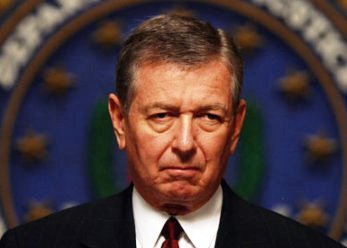In a press interview regarding the Iraq war, Vice-President Dick Cheney was once asked “Over 70 percent of Americans disagree with this war, what is your response?”

“So.”
It was a chilling moment of arrogance not easily forgotten by most Americans. It was the same when events were disclosed surrounding the “legal” wrangling that took place at the Justice Department regarding the domestic spying operation originated by Mr. Cheney.
It began with the clock running out for renewal of the program in November, 2003. Jack Goldsmith, chief of the Justice Department’s Office of Legal Counsel, had serious doubts about the legal memos prepared by John Yoo in support of domestic eavesdropping.
On March 10, 2004, Attorney General John Ashcroft and Deputy AG James Comey decide to withhold legal approval unless the surveillance program is scaled back. Hours later, Ashcroft is rushed to the hospital with acute pancreatitis and Comey becomes acting attorney general.
In a sequence of events from some creepy political thriller, Vice President Cheney presses Comey to reauthorize surveillance to no avail. With the program about to expire, President Bush dispatches White House Counsel Alberto Gonzales and Chief of Staff Andrew Card to Ashcroft’s bedside in the hospital and push the ailing attorney general for the necessary legal approvals. Ashcroft backs Comey and says he never should have ruled the program legal.
Flash forward – May 5, 2009.
The Washington Post reports that “Former Bush administration officials are launching a behind-the-scenes lobbying campaign to urge Justice Department leaders to soften an ethics report criticizing lawyers who blessed harsh detainee interrogation tactics, according to two sources familiar with the efforts.
“A draft report of more than 200 pages, prepared in January before Bush’s departure, recommends disciplinary action by state bar associations, rather than criminal prosecution, against two former department attorneys in the Office of Legal Counsel who might have committed misconduct in preparing and signing the so-called torture memos. State bar associations have the power to suspend a lawyer’s license to practice or impose other penalties.
“The memos offered support for waterboarding, slamming prisoners against a wall and other techniques that critics have likened to torture. The documents were drafted between 2002 and 2005.”
“Two of the authors, Jay S. Bybee, now a federal court judge on the U.S. Court of Appeals for the 9th Circuit, and John C. Yoo, now a law professor in Southern California,” are two of the individuals under investigation.
In fairness to Mr. Bush and Mr. Cheney, it’s important to recognize that both served at what was arguably the greatest single terrorist attack in the nation’s history. The threat of more such attacks was, at the time, a great and clear concern. It is not unreasonable to believe that they worked tirelessly to keep the country safe from further attacks.
But at what cost?
Somewhere along the line, both Bush and Cheney lost sight of one of the fundamentals that makes our country great: fair and equal treatment under the law. While history reminds us when we stray, the fair and equal tenet is a benchmark we have always strived to maintain.
However, somewhere, in their fervor to hold terrorists accountable and prevent more attacks, Mr. Cheney and Mr. Bush strayed. They made poor choices and acted unwisely by adopting an attitude of doing whatever they believed necessary inspite of the legal or ethical implications and then pressuring others to “make it legal.”
So how far should the current administration go in holding those responsible fully accountable? This is not an easy question and there are no easy answers. However, in sorting through the maze of personalities, timelines and decision-making, here are a few questions to consider:
1. Who needs to know?
2. Who will be helped and who will be harmed in the process?
3. What kind of actions should be taken against those responsible?
The answer to the first is obvious. The American people need to know if for no other reason, then to prevent similar misconduct in the future.
In answering the second, we need consider the affects on the stakeholders involved. Certainly, the American people would suffer if the truth were to remain hidden. However, great care must be taken in any investigation so as not to unnecessarily tarnish the reputations of any individuals involved, and that means waiting for the results of a thorough and objective investigation.
Finally, in determining the kinds of actions taken against those found responsible, I would hope for a bipartisan panel that would include independent, outside-the-beltway counsel, both legal and ethical, to weigh each situation and individual responsible.
I know what you’re thinking. Great, just what we need, another long, drawn-out political investigation looking into the past for purely political purposes.
Drawn out? Probably. Political, it should not be. But in looking into serious allegations that involve this country’s core principles, I believe that it’s necessary for all of us to know who did what, when; and the key decision-makers involved need to be held accountable.
Why?
Trust.
If the American people are ever going to have the kind of trust and confidence in their elected leaders that they need to have, they need to know the full and complete truth. Anything less is unacceptable.
Comments









